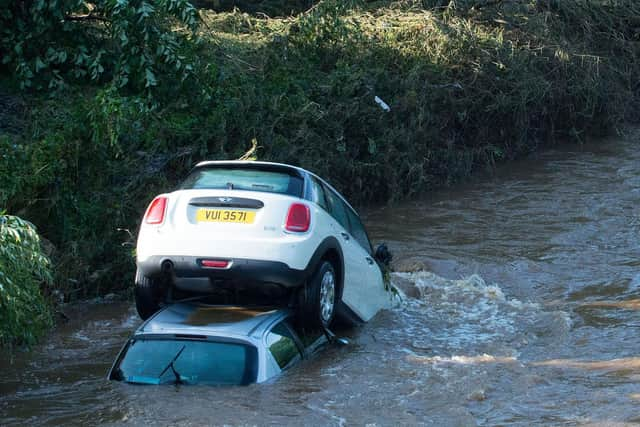New climate report shows limiting global warming to 2°C may soon beyond reach: this is 'a warning siren', says Colum Eastwood
and live on Freeview channel 276
The first instalment of the Intergovernmental Panel on Climate Change's (IPCC) sixth assessment report was published on Monday.
The report provides new estimates of the chances of crossing the global warming level of 1.5°C in the next decades, and finds that unless there are immediate, rapid and large-scale reductions in greenhouse gas emissions, limiting warming to close to 1.5°C or even 2°C will not be possible.
Advertisement
Hide AdAdvertisement
Hide AdThe report shows that emissions of greenhouse gases from human activities are responsible for approximately 1.1°C of warming since 1850-1900, and finds that averaged over the next 20 years, global temperature is expected to reach or exceed 1.5°C of warming.


This assessment is based on improved observational datasets to assess historical warming, as well progress in scientific understanding of the response of the climate system to human-caused greenhouse gas emissions.
Mr. Eastwood said: “The IPCC report confirms our worst fears about the pace of the climate crisis. Without radical intervention to reduce emissions, we will reach catastrophic tipping points within the next thirty years.
"Climate volatility will become the new normal, sea levels will rise threatening coastal communities and displacing huge numbers in the global south. This is a warning siren for those who still need it – our world is in crisis and the debate about the cause is over. We need to approach this emergency with the same urgency and resolve that the COVID-19 pandemic has generated.
Advertisement
Hide AdAdvertisement
Hide Ad“This is the defining global challenge of this, and the next, generation. The report authors are clear that we need to reduce emissions by an order of 50% and reach net zero urgently to have any chance of halting global temperature increases. And even then, our ocean levels will still rise and we will continue to feel the effects of warming to this point."
The report find that strong and sustained reductions in emissions of carbon dioxide (CO2) and other greenhouse gases would limit climate change.
While benefits for air quality would come quickly, it could take 20-30 years to see global temperatures stabilize, according to the IPCC Working Group I report, Climate Change 2021: the Physical Science Basis, approved on Friday by 195 member governments of the IPCC, through a virtual approval session that was held over two weeks starting on July 26.
"This report reflects extraordinary efforts under exceptional circumstances,” said Hoesung Lee, Chair of the IPCC. “The innovations in this report, and advances in climate science that it reflects, provide an invaluable input into climate negotiations and decision-making.”
Advertisement
Hide AdAdvertisement
Hide Ad“This report is a reality check,” said IPCC Working Group I Co-Chair Valérie Masson-Delmotte. “We now have a much clearer picture of the past, present and future climate, which is essential for understanding where we are headed, what can be done, and how we can prepare.”
The SDLP leader said: “There is no community that will be isolated from this crisis. In Northern Ireland alone over the last year we have seen more forest fires and flooding threatening lives and livelihoods. We all have a duty to act, but the real difference will be made by governments and large corporations.
“I have introduced a Climate Change and Green Jobs Bill at Westminster that will bring forward the date by which the British Government must legally reach net-zero emissions. The radical legislation will also require the Secretary of State to report on proposals for a Green Corporate Levy on large companies to generate new revenue to be spent on tackling the climate crisis. Those with the broadest shoulders, the deepest pockets and the most responsibility for the crisis must be compelled to help us avert irreversible climate breakdown.
“The scientific evidence is incontrovertible. The responsibility now rests with political leaders to take the brave and radical action needed to protect our planet.”
Advertisement
Hide AdAdvertisement
Hide Ad“Climate change is already affecting every region on Earth, in multiple ways. The changes we experience will increase with additional warming,” said IPCC Working Group I Co-Chair Panmao Zhai.
The report projects that in the coming decades climate changes will increase in all regions. For 1.5°C of global warming, there will be increasing heat waves, longer warm seasons and shorter cold seasons. At 2°C of global warming, heat extremes would more often reach critical tolerance thresholds for agriculture and health, the report shows.
But it is not just about temperature. Climate change is bringing multiple different changes in different regions – which will all increase with further warming. These include changes to wetness and dryness, to winds, snow and ice, coastal areas and oceans.
“It has been clear for decades that the Earth’s climate is changing, and the role of human influence on the climate system is undisputed,” said Masson-Delmotte. Yet the new report also reflects major advances in the science of attribution – understanding the role of climate change in intensifying specific weather and climate events such as extreme heat waves and heavy rainfall events.